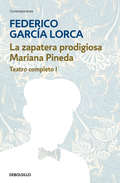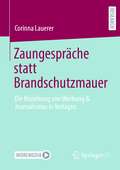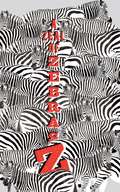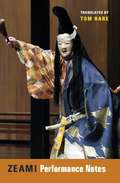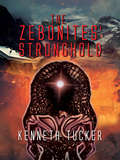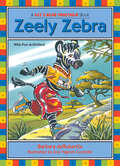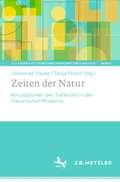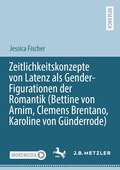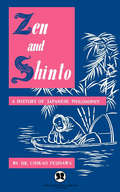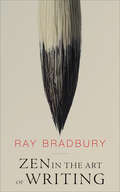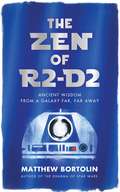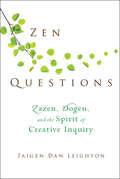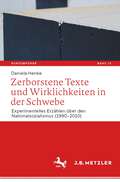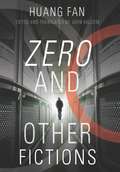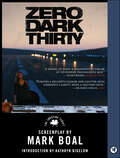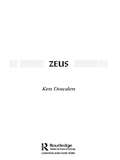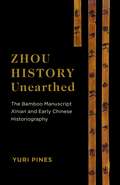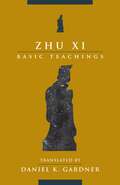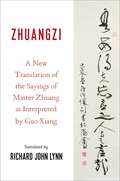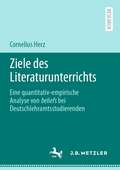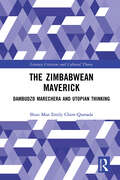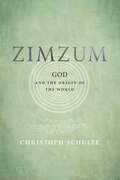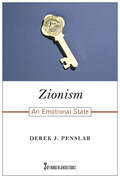- Table View
- List View
La zapatera prodigiosa | Mariana Pineda (Teatro completo #1)
by Federico García LorcaLa zapatera prodigiosa | Mariana Pineda es el cuarto volumen de la Biblioteca Federico García Lorca y el primero que compila su «Teatro completo». La figura de Federico García Lorca abraca, tanto en España como en el exterior, mucho más que su literatura. En este libro se ofrecen al lector clásicos lorquianos como Mariana Pineda, La zapatera prodigiosa, Retablillo de don Cristóbal y la Tragicomedia de don Cristóbal, junto con la Charla sobre teatro ofrecida por el autor a modo de introducción a este arte. La edición y los prólogos, a cargo de Miguel García-Posada, permiten al lector acercarse a la complejidad de su obra y disfrutar, a lo largo de los siete volúmenes que componen esta Biblioteca Federico García Lorca, de uno de los autores españoles más relevantes del siglo XX. Pablo Neruda escribió:«Porque por ti pintan de azul los hospitalesycrecen las escuelas y los barrios marítimos,y se pueblan de plumas los ángeles heridos,y se cubren de escamas los pescados nupciales,y van volando al cielo los erizos:por ti las sastrerías con sus negras membranasse llenan de cucharas y de sangrey tragan cintas rotas, y se matan a besos,y se visten de blanco.» --------------------------------------------------------------------------BIBLIOTECA FEDERICO GARCÍA LORCA Poesía competa:1. Libro de poemas | Primeras canciones | Canciones2. Romancero gitano | Poema del cante jondo3. Poeta en Nueva York | Sonetos Teatro completo:4. La zapatera prodigiosa | Mariana Pineda5. El público | Así que pasen cinco años6. Bodas de sangre | Yerma7. La casa de Bernarda Alba | Doña Rosita la soltera--------------------------------------------------------------------------
Zaungespräche statt Brandschutzmauer: Die Beziehung von Werbung & Journalismus in Verlagen
by Corinna LauererAnders als etwa über die Beziehung des Journalismus zu Politik oder zu Public Relations wissen wir kaum etwas über die Beziehung von Journalismus und Werbung. Wie viel Koordination zwischen Redaktion und Werbevermarktung darf es geben, um die wirtschaftliche Effizienz zu steigern ohne die Autonomie der Redaktion zu gefährden? Die Kommunikationswissenschaft begnügt sich vielfach damit, auf das Ideal der sogenannten „Brandschutzmauer“ zu verweisen, die die Redaktion in Gänze von ökonomischen Überlegungen abschirmen soll. Die vorliegende Arbeit geht hingegen der Frage nach, wie es um die Beziehung der Redaktion mit der Anzeigenabteilung bzw. der Werbevermarktung in deutschen Verlagen steht und zu welchen Zwecken diese sich miteinander koordinieren. Die Ergebnisse legen nahe, dass ein gewisses Maß an Koordination der Redaktion und Werbevermarktung stets existiert hat, die Integration aber zunimmt – teils in Gestalt harmonischer Zusammenarbeit in strategischen Belangen und teils in Form konfliktreicher Auseinandersetzungen über hybride Werbeformen wie Native Advertising oder Affiliate-Marketing.
A Zeal of Zebras
by Woop StudiosAn embarrassment of pandas, a galaxy of starfish, a shiver of sharks...these are all collective nouns used to describe their groups. Woop Studios, acclaimed for their work on the Harry Potter movies, has illustrated these quirky phrases, creating a series of extraordinarily beautiful art that has been collected here for the first time. The colorful introduction to animals and the alphabet is accessible for young children, while the gorgeous, whimsical art and clever wordplay make it perfect for design-savvy parents and inspired gift givers. Longer than the standard picture book, with high design and production values, this is a volume readers will want on their coffee tables in addition to their child's bookshelf.
Zeami: Performance Notes (Translations from the Asian Classics)
by Motoyiko ZeamiZeami (1363-1443), Japan's most celebrated actor and playwright, composed more than thirty of the finest plays of no drama. He also wrote a variety of texts on theater and performance that have, until now, been only partially available in English. Zeami: Performance Notes presents the full range of Zeami's critical thought on this subject, which focused on the aesthetic values of no and its antecedents, the techniques of playwriting, the place of allusion, the training of actors, the importance of patronage, and the relationship between performance and broader intellectual and critical concerns. Spanning over four decades, the texts reflect the essence of Zeami's instruction under his famous father, the actor Kannami, and the value of his long and challenging career in medieval Japanese theater. Tom Hare, who has conducted extensive studies of no academically and on stage, begins with a comprehensive introduction that discusses Zeami's critical importance in Japanese culture. He then incorporates essays on the performance of no in medieval Japan and the remarkable story of the transmission and reproduction of Zeami's manuscripts over the past six centuries. His eloquent translation is fully annotated and includes Zeami's diverse and exquisite anthology of dramatic songs, Five Sorts of Singing, presented both in English and in the original Japanese.
The Zebonites’ Stronghold
by Kenneth TuckerThey came to decadent America, tottering toward insurrection: The Zebonites, beings from a distant star had promised astounding medical and scientific advances in exchange for allowing them to set up a military stronghold in Florida's Everglades. Excited by their promises humanity's advancementof, Joe Tanner applied for and was hired for the contact team, a small group of individuals who could gain access to and lead other into the Zebonite's stronghold. But the Zebonites kept themselves shrouded in mystery, not revealing their natures, communicating only through the Zugs, mutated servants, and robotic bugs. Soon the world learned that the alliance had not been a request, but an ultimatum. The Zebonites, moreover, the treated human beings with contempt, considering themselves superior. They sought to instill dread by torturing, killing, and, if necessary, destroying the minds of those who oppose them...
Zeely Zebra: Long Vowel E (Let's Read Together ®)
by Barbara deRubertisLet&’s Read Together books merge rhyme and vowel sounds in delightfully zany stories kids will want to read again and again. Each of the 15 books in this classic series by award-winning author/educator Barbara deRubertis will give your child a jumpstart on reading success."Story lines are silly and inventive, and recall Dr. Seuss&’s Cat in the Hat for the building of rhythm and rhyming words." —School Library JournalZeely Zebra dreams of making the All Star Racing Team; how will she achieve her goal? (This easy-to-read story features the long &“e&” vowel sound.)
Zeiten der Natur: Konzeptionen der Tiefenzeit in der literarischen Moderne (LiLi: Studien zu Literaturwissenschaft und Linguistik #5)
by Johannes Pause Tanja ProkićNicht nur die Zeit des Menschen, auch die Eigenzeiten der Literatur stehen heute in einem vielschichtigen Spannungsverhältnis zur Zeit der Natur. Doch welche Mittel besitzt die Literatur, um die menschliche Wahrnehmungsfähigkeit für die Zeiten anderer Lebewesen oder gar für planetarische Zeitmaße zu sensibilisieren? Wie geht die zunehmende Mathematisierung der Zeit in sie ein? Und in welchem Verhältnis stehen literaturhistorische Zäsuren zu Paradigmenwechseln in den Naturwissenschaften? Diesen und weiteren Fragen geht der Sammelband nach, indem er exemplarisch die Genealogie der literarischen Verzeitlichung von Natur nachvollzieht – von den kosmischen Fiktionen um 1800 bis zu den Geschichten vom Anthropo-, Cthulhu- und Kapitalozän, die das 21. Jahrhundert prägen.
Zeitlichkeitskonzepte von Latenz als Gender-Figurationen der Romantik (Bettine von Arnim, Clemens Brentano, Karoline von Günderrode)
by Jessica Fischer„Doch alles ist ganz anders nun geworden“. Dieses Zitat aus Günderrodes romantischem Gedicht „Vorzeit, und neue Zeit“ spiegelt die Veränderungen der und um die Zeit wider. Im Gedicht erlebt das lyrische Ich ein „Nun“, die Gegenwart, die sich von der Vergangenheit abgespalten hat und eine Zukunft ermöglicht, die die Gegenwart noch nicht zulässt. Die Zeit verändert sich. Doch was ist das - Zeit? Und wie wird Zeit und Zeitlichkeit in der Lyrik um 1800 wahrgenommen? Das sind Fragestellungen, die in den Gedichten offensichtlich selbst thematisiert und reflektiert werden. Und weiterhin: Was ist denn im „Nun“ anders geworden? Was ist es, das sich verändert hat? Dieses Etwas ist nicht sichtbar. Es ist verborgen. Die präsentische Zeit, die hier angesprochen wird, ist die „Latenz“. Im aktuellen literaturwissenschaftlichen Diskurs nimmt die Latenz einen besonderen Stellenwert ein. Bislang wurde untersucht, wie „Latenz“ in der Gegenwartsliteratur dargestellt wird. Sie ist jedoch kein Begriff der Gegenwartsliteratur, sondern findet sich in dem oben veranschaulichten Sinne bereits in der Romantik, genauer in der Zeit um 1800. In der aktuellen Forschung wurde noch nicht geklärt, wie „Latenz“ in der Romantik dargestellt wird. Diese Forschungslücke soll anhand der Lyrik von Clemens Brentano, Bettine von Arnim und Karoline von Günderrode in diesem Buch geschlossen werden.
Zen and Shinto
by Dr Chikao FujisawaHow do the Japanese talk about their native philosophy, Shinto, a decade and a half after the Western Allies abolished it as a state religion? What is its relationship to Buddhism, and particularly to Zen? How modern can this very ancient creed ever be? These are some of the questions considered in this study by Dr. Chikao Fujisawa, who specialized in the study of traditional Japanese philosophy and its effect on modern society. Zen and Shinto is a strong plea to rectify the steps taken to eradicate Shinto, the very substance of Japanese life and thought. At the same time, it offers new insight into the amazing adaptability of the Japanese psyche--its depth, vitality and universality--and its remarkable capacity to assimilate foreign thought and ideas, and thus contribute to the world's hope for permanent peace.
Zen in the Art of Writing: Essays On Creativity
by Ray BradburyThe celebrated author of Fahrenheit 451 and The Martian Chronicles offers inspiration and insight on finding one&’s muse and channeling it onto the page. Acclaimed writer of novels and short stories as well as screen- and stage plays, Ray Bradbury has established himself as one of the most legendary voices in science fiction and fantasy. In Zen in the Art of Writing, he shares how his unbridled passion for creating worlds made him a master of the craft. Part memoir, part philosophical guide, the essays in this book teach the joy of writing. Rather than focusing on the mechanics of putting words together, Bradbury&’s zen is found in the celebration of storytelling that drove him to write every day. Bringing together eleven essays and a series of poems written with his own unique style and fervor, Zen in the Art of Writing is a must read for all prospective writers and Bradbury fans. &“Bradbury lovers will find this a Bradbury feast.&” —Kirkus Reviews
Zen in the Art of Writing: Essays on Creativity
by Ray Bradbury"Every morning I jump out of bed and step on a land mine. The land mine is me. After the explosion, I spend the rest of the day putting the pieces back together. Now, it's your turn. Jump! Zest. Gusto. Curiosity. These are the qualities every writer must have, as well as a spirit of adventure. In this exuberant book, the incomparable Ray Bradbury shares the wisdom, experience, and excitement of a lifetime of writing. Here are practical tips on the art of writing from a master of the craft-everything from finding original ideas to developing your own voice and style-as well as the inside story of Bradbury's own remarkable career as a prolific author of novels, stories, poems, films, and plays. Zen in the Art Of Writing is more than just a how-to manual for the would-be writer: it is a celebration of the act of writing itself that will delight, impassion, and inspire the writer in you. In it, Bradbury encourages us to follow the unique path of our instincts and enthusiasms to the place where our inner genius dwells, and he shows that success as a writer depends on how well you know one subject: your own life.
The Zen of R2-D2: Ancient Wisdom from a Galaxy Far, Far Away
by Matthew BortolinEntertaining and engaging, this new follow-up to Wisdom&’s bestseller The Dharma of Star Wars stands on its own and will captivate a broad audience with the Star Wars story from a Buddhist perspective.Did you ever wonder why R2-D2 is: Always calm and cool under pressure, The key to the rebellion&’s survival, The one who never fails to save the day? Could it be because he&’s secretly a Zen master? Discover your inner R2—and the truth about who you really are! This delightful and illuminating romp unfolds in the form of a fictional dialogue between the author—a die-hard Star Wars devotee with a deep connection to Zen—and two cosplayers dressed as C-3PO and R2-D2 who insist on being called by their character names. Along the way, you&’ll come to see what everyone&’s favorite astromech can teach us about peace, happiness, and life&’s true meaning.
Zen Questions
by Taigen Dan LeightonWhether speaking of student or master, Zen hinges on the question. Zen practice does not necessarily focus on the answers, but on finding a space in which we may sustain uncertainty and remain present and upright in the middle of investigations. Zen Questions begins by exploring "The World of Zazen,"--the foundational practice of the Zen school--presenting it as an attitude of sustained inquiry that offers us an entryway into true repose and joy. From there, Leighton draws deeply on his own experience as a Zen scholar and teacher to invite us into the creativity of Zen awareness and practice. He explores the poetic mind of Dogen with the poetry of Rumi, Mary Oliver, Gary Snyder, and even "the American Dharma Bard" Bob Dylan. What's more, Leighton uncovers surprising resonances between the writings of America's Founding Fathers--including Thomas Jefferson and Ben Franklin--and the liberating ideals at the heart of Zen.
Zerborstene Texte und Wirklichkeiten in der Schwebe: Experimentelles Erzählen über den Nationalsozialismus (1990–2010) (Kontemporär. Schriften zur deutschsprachigen Gegenwartsliteratur #13)
by Daniela HenkeExperimentelle Texte über Holocaust und Nationalsozialismus fallen durch ein Forschungsraster. Durch ihre sperrige Form entziehen sie sich den Kategorien der memory studies – wegen ihrer brisanten Thematik sind sie ungeeignet für das rein formale Erkenntnisinteresse der klassischen Narratologie. Getragen von der Idee, dass Erzählformen selbst erzählen, verfolgt diese Untersuchung zwei Ziele. Zunächst wird eine allgemeine Typologie experimentellen Erzählens entworfen. Darauf folgen Analysen von Erzähltexten der Gegenwartsliteratur: Heldenfriedhof von Thomas Harlan, Morbus Kitahara von Christoph Ransmayr, Nahe Jedenew von Kevin Vennemann, Harlem Holocaust von Maxim Biller und Frühling von Thomas Lehr. Im Mittelpunkt stehen dabei die Funktionen experimentellen Erzählens mit Blick auf den ‚Undarstellbarkeitstopos‘ in seinen verschiedenen Variationen.
Zero and Other Fictions (Modern Chinese Literature from Taiwan)
by Fan HuangHuang Fan burst onto Taiwan's literary scene in the 1980s, publishing pointed urban portraits and political satires that captured the reading public's attention. After decades of innovative work, he is now one of Asia's most celebrated authors, crucial to understanding the development of Taiwanese literature over the past fifty years.The first collection of Huang Fan's work to appear in English, this anthology includes Zero, a prize-winning dystopian novella echoing George Orwell's chilling 1984. Set in a postapocalyptic world, Zero features Xi De, a young man raised in an elite community who risks everything to challenge his society's charismatic leader and technocratic rule. Huang Fan's novella poignantly illustrates the quandary of an idealistic man trapped among conflicting claims to truth, unsure whether to think of himself as heroic or foolish in his ultimate choice of resistance and sacrifice.This anthology also features three critically acclaimed short stories: "Lai Suo," which established Huang Fan's reputation as a groundbreaking author; "The Intelligent Man"; and "How to Measure the Width of a Ditch." In "Lai Suo," a naïve individual becomes the pawn of powerful men intent on political advancement. In "How to Measure the Width of a Ditch," an unreliable narrator spins an absurdist, metafictional tale of his childhood in Taipei, and in "The Intelligent Man," Huang Fan weaves an allegorical satire about political reunification set against a backdrop of Taiwanese migration to the United States, with a trenchant look at expanding business interests in mainland China and Southeast Asia. All together, these remarkable works portray the tensions and aspirations of modern Taiwan.
Zero Dark Thirty: The Shooting Script (Shooting Script Ser.)
by Mark BoalThe hunt for Osama bin Laden preoccupied the world and two American presidential administrations for more than a decade. But in the end, it took a small, dedicated team of CIA operatives to track him down. Every aspect of their mission was shrouded in secrecy. Though some of the details have since been made public, many of the most significant parts of the intelligence operation—including the central role played by that team—are brought to the screen for the first time in a nuanced and gripping new film by the Oscar®-winning creative duo of Kathryn Bigelow and Mark Boal, starring Jessica Chastain, Jason Clarke, Joel Edgerton, Jennifer Ehle, Mark Strong, Kyle Chandler, and Edgar Ramirez.The Newmarket Shooting Script Book includes: Introduction by Kathryn Bigelow Complete shooting script Q&A with Mark Boal by Rob Feld Production notes Storyboards Complete cast and crew credits
Zeus (Gods and Heroes of the Ancient World)
by Ken DowdenThe first book to capture a complete picture of the most important of Greek gods in one reliable volume for almost seventy years, this masterly and comprehensive study brings a new-millennium examination of the fascinating god Zeus. Broad in scope, the book looks at myth, art, cult, philosophy, drama, theology and European painting amongst much more, and allows us to take seriously what it was to worship and respect the greatest of Greek gods, and to live through the aftershock of the Middle Ages and modern times. Showing the evidence along the way, Zeus is student-friendly and includes: a range of illustrations and maps translated passages from ancient authors a chronology and excellent indexing. Looking at the ancient Greeks their predecessor and their successors – the Romans and beyond – the book is engagingly written and speaks to a modern audience: this is Zeus from our remote ancestors to Wagner, and into the computer age.
Zhou History Unearthed: The Bamboo Manuscript Xinian and Early Chinese Historiography
by Yuri PinesThere is a stark contrast between the overarching importance of history writing in imperial China and the meagerness of historical texts from the centuries preceding the imperial unification of 221 BCE. However, recently discovered bamboo manuscripts from the Warring States period (453–221 BCE) have changed this picture, leading to reappraisals of early Chinese historiography. These manuscripts shed new light on questions related to the production, circulation, and audience of historical texts in early China; their different political, ritual, and ideological usages; and their roles in the cultural and intellectual dynamics of China’s vibrant pre-imperial age.Zhou History Unearthed offers both a novel understanding of early Chinese historiography and a fully annotated translation of Xinian (String of Years), the most notable historical manuscript from the state of Chu. Yuri Pines elucidates the importance of Xinian and other recently discovered texts for our understanding of history writing in Zhou China (1046–255 BCE), as well as major historical events and topics such as Chu’s cultural identity. Pines explores how Xinian challenges existing interpretations of the nature and reliability of canonical historical texts on the Zhou era, such as Zuo zhuan (Zuo Tradition/Commentary) and Records of the Historian (Shiji). A major work of scholarship and translation, Zhou History Unearthed sheds new light on early Chinese history and historiography, demonstrating how new archaeological findings are changing our knowledge of China’s pre-imperial days.
Zhu Xi: Basic Teachings
by Xi ZhuZhu Xi (1130–1200) was the preeminent Confucian thinker of the Song dynasty (960–1279). His teachings profoundly influenced China, where for centuries after his death they formed the basis of the country’s educational system. In Korea, Japan, and Vietnam as well, elites embraced his inspired and authoritative synthesis of Confucian thought.In Zhu’s eyes, the great Way of China was in decline, with its very survival threatened by external enemies and internal moral weakness. In his writings and teaching, Zhu took as his mission the revival of the Confucian tradition, the source of China’s greatness, and its transmission to future generations. For him, restoring Confucianism to its rightful place required drawing on the tradition’s whole sweep, from the sacred texts of the sages and worthies of antiquity to the more recent writings of the great thinkers of the tenth and eleventh centuries.This book presents the essential teachings of the new Confucian (“Neo-Confucian”) philosophical system that Zhu Xi forged, providing a concise introduction to one of the most important figures in the history of Chinese thought. It offers selections from the Classified Conversations of Master Zhu (Zhuzi yulei), a lengthy collection of Zhu’s conversations with disciples. In these texts, Zhu Xi reflects on the Confucian teachings of the past, revising and refining his understanding of them and shaping that understanding into a cohesive system of thought. Daniel K. Gardner’s translation renders these discussions and sayings in a conversational style that is accessible to new and more advanced readers alike.
Zhuangzi: A New Translation of the Sayings of Master Zhuang as Interpreted by Guo Xiang (Translations from the Asian Classics)
by Richard John LynnThe Zhuangzi (Sayings of Master Zhuang) is one of the foundational texts of the Chinese philosophical tradition and the cornerstone of Daoist thought. The earliest and most influential commentary on the Zhuangzi is that of Guo Xiang (265–312), who also edited the text into the thirty-three-chapter version known ever since. Guo’s commentary enriches readings of the Zhuangzi, offering keen insights into the meaning and significance of its pithy but often ambiguous aphorisms, narratives, and parables.Richard John Lynn’s new translation of the Zhuangzi is the first to follow Guo’s commentary in its interpretive choices. Unlike any previous translation into any language, its guiding principle is how Guo read the text; Lynn renders the Zhuangzi in terms of Guo’s understanding. This approach allows for the full integration of the text of the Zhuangzi with Guo’s commentary. The book also features a translation of Guo’s complete interlinear commentary and is annotated throughout.A critical introduction includes a detailed account of Guo’s life and times as well as analysis of his essential contributions to the arcane learning (xuanxue) of the fourth century and the development of Chinese philosophy. Lynn sheds new light on how the Daoist classic, which has often been seen as a timeless book of wisdom, is situated in its historical context, while also considering it as a guide to personal cultivation and self-realization.
Ziele des Literaturunterrichts: Eine quantitativ-empirische Analyse von beliefs bei Deutschlehramtsstudierenden
by Cornelius HerzWarum sollte Literatur im Schulunterricht des 21. Jahrhunderts thematisiert werden? Die vorliegende quantitativ-empirische Fragebogenstudie untersucht dieses Themenfeld bei zukünftigen Lehrer*innengenerationen an deutschen Universitäten. Dazu wurden in Auseinandersetzung mit teils widersprüchlichen Forschungsergebnissen der letzten beiden Dekaden Haltungen bzw. beliefs bei Studierenden des Schulfaches Deutsch für die Sekundarstufen ergründet und in Bezug auf neue Impulse für bisherige Befunde ausgewertet. Insbesondere anhand fachlicher Dimensionen lassen sich unterschiedliche Gruppierungen charakterisieren. In dieser Form werfen die Analysen ebenfalls Fragen zur Selbstverständigung über die Schwerpunkte der literaturdidaktischen Ausbildung auf. So bieten sie über Aussagen zu den Lehrer*innen von morgen und zu deutschdidaktischen Aushandlungsprozessen hinaus Ansatzpunkte für hochschuldidaktische Perspektiven.
The Zimbabwean Maverick: Dambudzo Marechera and Utopian Thinking (Literary Criticism and Cultural Theory)
by Shun Man CHOW-QUESADAThis book seeks to unfold the complexity within the works of Dambudzo Marechera and presents scholars and readers with a way of reading his works in light of utopian thinking. Writing during a traumatic transitional period in Zimbabwe’s history, Marechera witnessed the upheavals caused by different parties battling for power in the nation. Aware of the fact that all institutionalized narratives – whether they originated from the colonial governance of the UK, Ian Smith’s white minority regime, or Zimbabwe’s revolutionary parties – appeal to visions of a utopian society but reveal themselves to be fiction, Marechera imagined a unique utopia. For Marechera, utopia is not a static entity but a moment of perpetual change. He rethinks utopia by phrasing it as an ongoing event that ceaselessly contests institutionalized narratives of the postcolonial self and its relationship to society. Marechera writes towards a vision of an alternative future for the country. Yet, it is a vision that does not constitute a fully rounded sense of utopia. Being cautious about the world and the operation of power upon the people, rather than imposing his own utopian ideals, Marechera chooses instead to destabilize the narrative constitution of the self in relation to society in order to turn towards a truly radical utopian thinking that empowers the individual.
Zimzum: God and the Origin of the World (Jewish Culture and Contexts)
by Christoph SchulteThe Hebrew word zimzum originally means “contraction,” “withdrawal,” “retreat,” “limitation,” and “concentration.” In Kabbalah, zimzum is a term for God’s self-limitation, done before creating the world to create the world. Jewish mystic Isaac Luria coined this term in Galilee in the sixteenth century, positing that the God who was “Ein-Sof,” unlimited and omnipresent before creation, must concentrate himself in the zimzum and withdraw in order to make room for the creation of the world in God’s own center. At the same time, God also limits his infinite omnipotence to allow the finite world to arise. Without the zimzum there is no creation, making zimzum one of the basic concepts of Judaism.The Lurianic doctrine of the zimzum has been considered an intellectual showpiece of the Kabbalah and of Jewish philosophy. The teaching of the zimzum has appeared in the Kabbalistic literature across Central and Eastern Europe, perhaps most famously in Hasidic literature up to the present day and in philosopher and historian Gershom Scholem’s epoch-making research on Jewish mysticism. The Zimzum has fascinated Jewish and Christian theologians, philosophers, and writers like no other Kabbalistic teaching. This can be seen across the philosophy and cultural history of the twentieth century as it gained prominence among such diverse authors and artists as Franz Rosenzweig, Hans Jonas, Isaac Bashevis Singer, Harold Bloom, Barnett Newman, and Anselm Kiefer.This book follows the traces of the zimzum across the Jewish and Christian intellectual history of Europe and North America over more than four centuries, where Judaism and Christianity, theosophy and philosophy, divine and human, mysticism and literature, Kabbalah and the arts encounter, mix, and cross-fertilize the interpretations and appropriations of this doctrine of God’s self-entanglement and limitation.
Zionism: An Emotional State (Key Words in Jewish Studies)
by Derek J. PenslarEmotion lies at the heart of all national movements, and Zionism is no exception. For those who identify as Zionist, the word connotes liberation and redemption, uniqueness and vulnerability. Yet for many, Zionism is a source of distaste if not disgust, and those who reject it are no less passionate than those who embrace it. The power of such emotions helps explain why a word originally associated with territorial aspiration has survived so many years after the establishment of the Israeli state. Zionism: An Emotional State expertly demonstrates how the energy propelling the Zionist project originates from bundles of feeling whose elements have varied in volume, intensity, and durability across space and time. Beginning with an original typology of Zionism and a new take on its relationship to colonialism, Penslar then examines the emotions that have shaped Zionist sensibilities and practices over the course of the movement’s history. The resulting portrait of Zionism reconfigures how we understand Jewish identity amidst continuing debates on the role of nationalism in the modern world.

